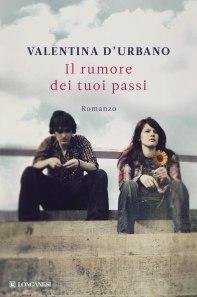
Valentina D’Urbano is a young Italian novelist. Il Rumore dei tui passi (The Sound of Your Footsteps) is her first novel. She won a publishing contract with Longanesi thanks to a competition. The novel has been translated into French under the title Le bruit de tes pas and into German Mit zwanzig hat man kein Kleid für eine Beerdigung. Hopefully an English translation will be next.
This novel is like a kick in the gut. It describes a world we dont know anything about, but it’s a world that the young writer knows all too well, as she grew up under similar circumstances.
The book is set in Rome, in La Fortezza – The Fortress -, in the late 70s and 80s. It starts with a funeral and a laconic voice telling us that her “twin” has died. Bea and Alfredo are called the twins because they are inseparable, not because they are siblings. They met because their families both live in La Fortezza – this is also a nickname. La Fortezza is some sort of abandoned housing project where the poorest of the poor land. Most of the families are squatters and their miserable, small apartments can be snatched from them at all times. “Never leave your apartment unattended” is one of the earliest lessons Bea, her brother Francesco, Alfredo and Arianna, her best friend, learn at an early age. If you leave the apartment, it’s possible that when you come back, you’ll find that all your belongings have been thrown from a window and another family claims the place.
La Fortezza is a place without hope. Most people have no job and will never have one; they drink or take drugs; they hit their children and their wives. They have no chance of ever getting out because when they apply for a job somewhere and have to say they come from la Fortezza, it’s over. People from La Fortezza are not hired. They are said to be criminals and drug addicts.
One way of dealing with a bleak situationlike this is domestic violence and addiction, another is to look the other way. Nothing is named in La Fortezza. People and things have nicknames. Bad situations are ignored. Arianna can get pregnant at 15 and abort and nobody will ever speak about it.
Bea’s mother got pregnant with Bea when she was only 15. She and Bea’s father were lucky to be able to live in La Fortezza. It’s one step from being homeless. They rarely have jobs, but at least they are kind and caring. The familial environment is rough; there’s a lot of swearing, the kids are slapped, but in spite of that Bea and Franceso know their parents love them and do everything for them. They even accept Alfredo in their home. Alfredo lives above and his father is anything but kind and caring. He’s a single parent, unemployed, alcoholic and beats up his three sons regularly. More than once, someone has to interfere and make sure he doesn’t kill them.
Bea’s and Alfredo’s feelings for each other are deep. But it’s a love-hate relationship, one that strengthens them as much as it weakens them.
From the beginning we know things go wrong, or Alfredo wouldn’t be dead and Bea wouldn’t attend his funeral.
Valetina d’Urbano’s book is written in an amazing, sparse style, told in a painfully laconic voice which isn’t devoid of tenderness. This is not the Rome tourists see. This world is far from anything most Europeans know. This is poverty at its ugliest. All they have is dreams. Some have the power to make them come true. Most don’t.
Interestingly it’s a book that contains a lot of beautiful passages and it certainly makes us think. People in this novel sit on the balcony in summer, making plans for holidays at the sea that they will never take. They are overwhelmed with joy when they own more than one sweater. Reading a book like this certainly shows us that we’re not as grateful as we could be. And it illustrates that this type of poverty is as bad as a congenital disease. Escaping it is almost impossible.
D’Urbano is particularly good at descriptions. We feel the suffocating heat in summer, the cold in winter, we experience the frustration and boredom they have to endure.
I admire that she was able to escape this world and that she didn’t turn this book into a pity-party. It’s a powerful account of a hidden world, a story I’m not likely to forget.
